#autism & Alexithymia
Text
man alexithymia is actually a bitch
the inability to understand the full extent of how you're feeling and having no idea how to cope with it
then you end up coping with it in very harmful ways instinctively before your logic has finally realised how you're feeling
it's a constant suffering cycle
#actually autism#autism spectrum#autism spectrum disorder#autism things#autistic#autistic life#asd#autistic problems#being autistic#autism#alexithymia#autism alexithymia
36 notes
·
View notes
Text
Autism culture is thinking "I don't know" is a perfectly normal answer to "how are you?" or "how are you feeling?" and getting confused when other people think that's a weird answer
436 notes
·
View notes
Text

I find it hard to tell what I'm feeling sometimes, but I know that Soup Brain means I should probably rest
1K notes
·
View notes
Text
Having autism/ alexithymia is like "You made me feel something and in 3-5 business days when I figure out what it was, then you'll be sorry!"
1K notes
·
View notes
Text
Alexitthymia

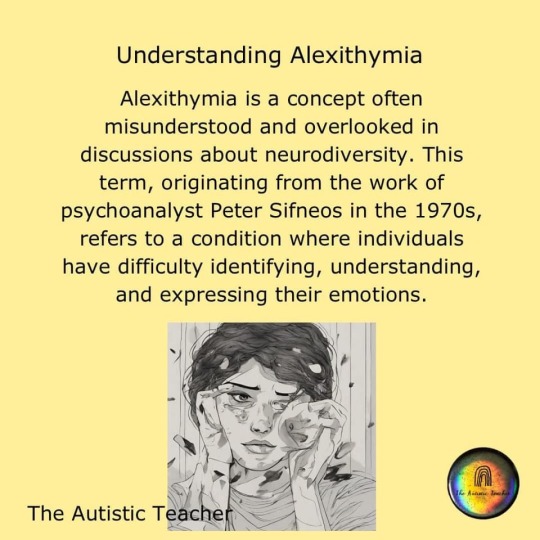


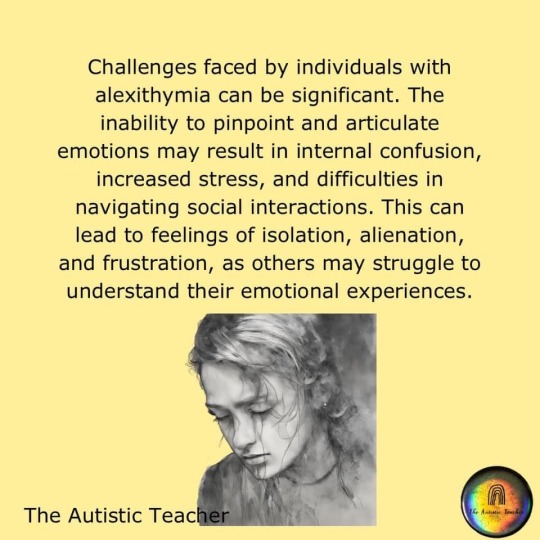
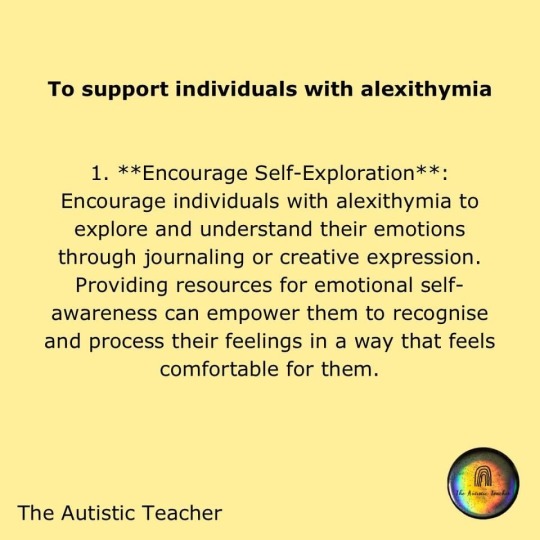

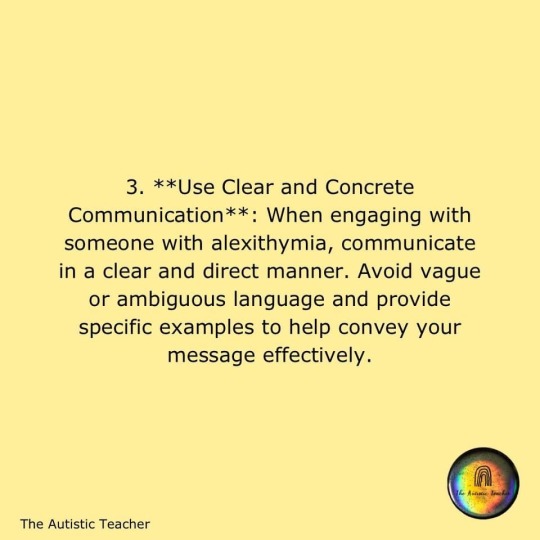
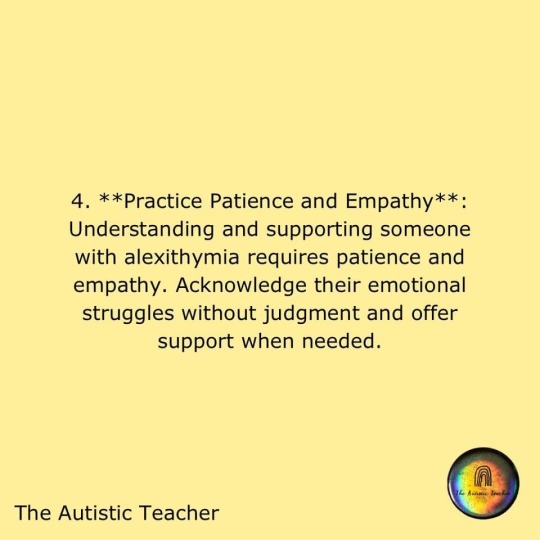
The Autistic Teacher
#autism#actually autistic#autism awareness month#autism acceptence month#alexithymia#alexithymia explained#emotional expression#neurodivergence#neurodiversity#actually neurodivergent#feel free to reblog/share#The Autistic Teacher (Facebook)
325 notes
·
View notes
Text
staring at a blank page, burning with emotion
having no way to articulate it.
if there ever was hell on earth, i think that'd be it. trapped in your own mind with raging fires and no way to show everyone that you're aflame.
#autism#asd#actuallyautistic#actually adhd#being autistic#neurodivergencies#adhd#neurodivergent#its the neurodivergency#actually autistic#alexithymia#neurospicy#neurodiversity#neurodivergence#audhd#poetry#spilled poetry#poetic#words words words#prose#poet#poems#spilled words#spilled thoughts#spilled writing#spilled ink
506 notes
·
View notes
Text
All my Bungou Stray Dog Headcanons, ALL OF THEM
(more to be added)
-T4T skk (masc)
-sskk
-Rampoe
-Oda and Ango were dating
-Dazai is touch starved
-Chuuya is touch-adverse, Dazai being an exception
-Chuuya loves supplying Dazai with all the touch he craves (just like me fr)
-Chuuya has top surgery, but not on T
-Dazai is on T, but no top surgery
-Dazai binds with bandages (DON’T DO THIS ITS VERY BAD AND UNHEALTHY)
-Dazai and Chuuya were dating in the mafia and broke up after Dazai left
-They got back together after the truce
-Chuuya was very hurt by Dazai leaving, but they talked it out and Chuuya understands why Dazai left how he did
-Dazai and Chuuya live together
-Chuuya has central heterochromia
-Chuuya’s corruption marks are always visible, albeit very faint when not active
-Chuuya’s manga hair color is his natural color, occasionally dying it ginger
-Chuuya has intervened and stopped multiple of Dazai’s attempts
-Dazai does Chuuya’s nails
-Dazai doesn’t self harm (he dislikes pain)
-Dazai actually has abnormally low pain tolerance, but has learned to hide it in the mafia
-Dazai has autism, which is why he struggles with showing his emotions, but trauma (Mori) has led him to believe it’s because he isn’t human
-Dazai has severe medical trauma and outright refuses to enter Yosano’s office/clinic
-Dazai has mistaken Yosano for Mori on particularly bad days
-Dazai is NOT allowed on the roof of the agency without someone else there
-Dazai is blind in his right eye
-This is from @asingleflyingfuck but Dazai has alexithymia
-Within the ADA, Dazai is the closest with Rampo
-Dazai and Rampo play video games together, both enjoying Danganronpa
-Rampo and Poe don’t live together (yet)
-Rampo and Poe are both autistic
-Rampo is also ADHD
-Rampo is farsighted, which was the original reason Fukuzawa bought the glasses
-Rampo is legally adopted by Fukuzawa (all the minors that join the agency are)
-Poe is blind
-Karl is a seeing eye raccoon that guides him like ratatouille
-Trans masc Akutagawa
-Akutagawa isn’t on T or have top surgery due to his health issues
-Akutagawa has haphephobia
-Atsushi chuffs (tiger equivalent of purring)
-Atsushi has been legally adopted by Dazai (He doesn’t know)
-Atsushi has schizophrenia
-Kunikida has OCD
-Everyone has some form/amount of PTSD
Posts of headcanons I like:
This is what I was saying about Rampo’s poor eyesight:
#skk#soukoku#sskk#shin soukoku#ranpoe#odango#chuuya nakahara#chuya nakahara#dazai osamu#akutagawa ryuunosuke#atsushi nakajima#ranpo edogawa#rampo edogawa#kunikida doppo#fukuzawa yukichi#edgar allan poe#poe bsd#yosano akiko#bsd#bungo stray dogs#bungou stray dogs#dazai angst#ptsd#sh mention#schizophrenia#haphephobia#blind poe#service animal karl#alexithymia#autism
87 notes
·
View notes
Text
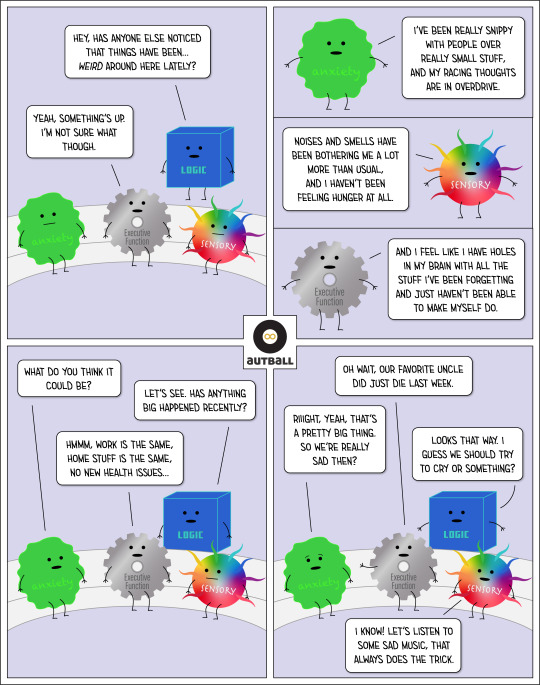
Who else has to use their powers of deduction to figure out what they’re feeling?
It could be from something called Alexithymia. It can happen to anyone, usually when trauma is involved, but it’s a common experience for Autistic people for a couple of extra reasons.
One is that it’s linked to struggles with interoception, and I don’t know if you’ve heard, but Autistic people do tend to have some differences in sensory processing. 🙃
The other is that we’re very often gaslit when it comes to our feelings and experiences, starting from a very early age, which leads to doubting our own reactions to things and never learning how to process, or even recognize, our emotions or their connection to physical sensations.
This is how it often goes for me. I notice physical, sensory, and cognitive changes first and have to work my way backwards to see if there are any big feelings behind it. (And yes, I really did have to do this even when my uncle died.) I might then need help accessing those feelings in order to let them out, which is where music or certain movies come in handy.
What about you? Do you sometimes have to backwards engineer your emotions? And what’s your go-to for bringing them to the surface so they can come out?
#actually autistic#autistic#autism#autistic problems#autistic experiences#autistic artist#autistic feels#adhd#audhd#neurodivergent#alexithymia#autistic things
881 notes
·
View notes
Text
The beginner autistic guide to common terms in our community (with extra context!).
*Disclaimer, I’m not a professional. This is just knowledge from my experience as an autistic person. Please feel free to correct anything :)
These definitions will include some of my own opinions and thoughts, especially on the more controversial terms. This is simply to help better prepare new autistic community members for conversations they become engaged in. Having all the perspective and context you can have can be very helpful when moving into new social spaces.
Autism (Or Autistic Spectrum Disorder, ASD): A neurodevelopmental disorder that is present from very early childhood. It’s mostly recognised through difficulties with social interaction and restricted and/or repetitive behaviours. The way it is referred to as “Autism Spectrum Disorder” is specifically referring to the fact that autism presents in countless ways. There are common traits and patterns, but the severity and complexity of those traits and symptoms is infinite.
NOTE: This does not mean that ‘everyone is a little bit autistic’. You are either autistic or you are not. It just means that if you have autism, it may present very differently to other autistic people you know.
Asperger’s Syndrome: Asperger’s syndrome is usually considered an older term for a ‘subtype’ of autism. The term is considered outdated by the DSM-5 and no longer used in that document. However it is still used in a lot of other countries. Now it is becoming more socially known that ‘Asperger’s syndrome’ is just a specific presentation of autism. Many autistics don’t like the use of the word ‘Asperger’s’ because of a couple reasons:
The term has a long history with NAZI’s and eugenics.
The term seems to basically mean ‘high functioning’ autistic, which simplifies the condition.
Asperger’s Syndrome is defined in a very similar way to autism, however people with “Asperger’s’ may be described as ‘gifted’ or ‘intellectual’.
It’s important to note that many people still identify themselves with the term ‘Asperger’s’. While it is good to be educated and up to date with terminology, some people have identified with this term their whole life and it’s not wrong to use the term for one-self. But either way, I do encourage you to do more research if you are comfortable.
Neurotype: Can be basically defined as the type of brain function one has. Some people consider autism a neurotype, and then neurotypical as another neurotype. However, many people claim that autism is ‘just another neurotype’. This is a harmful way of thinking about autism because autism is a disability. Labelling it as a ‘neurotype’ belittles all the struggles autistic people have that make them disabled. Autism is a spectrum and so some autistic people may not really consider themselves disabled, but many do.
Neurotypical (NT): A non-autistic person with no other mental conditions.
Allistic: A non-autistic person who can still have other mental conditions, such as depression or ADHD.
Neurodivergent (ND): Traditionally ‘Neurodivergent’ has been used to mean either autistic or ADHD. However in some contexts it is used to mean someone with any mental condition, including personality disorders or mental illnesses such as depression and anxiety.
Neurodiversity: a term used to describe the fact that there are many neurotypes in the world. It is used to imply that differences in brain development and function should be accepted as relatively normal. I think this is a good sentiment, but that some neurotypes should still be considered disabilities as well as a neurotype, so as not to diminish the struggles specific neurotypes go through.
High functioning/Low functioning: The labels of functioning are terms used to describe how independent an autistic (or other kind of disabled) person is able to be. Many autistics do NOT like the use of these terms for a couple reasons:
It tends to focus on the way an autistics disability affects the allistic people around them.
It simplifies the experience of the individual with autism to how independent they are, and is also not very descriptive for anyone trying to help the said autistic person.
High needs/Low needs: These are labels used to describe how much assistance an autistic (or other kind of disabled) person may need. It is slightly preferred by autistic people as the language is more centred to what the autistic person needs, rather than how independent they can be.
NOTE, many autistic people would argue that these terms are basically the same as high functioning and low functioning. I personally consider it to be best to just state someones highest needs or difficulties. For example “Olivia is nonverbal and highly sensitive to light and noise.”.
Masking: Masking is the act of hiding ones autistic traits to appear to be neurotypical. Masking is often a survival strategy developed by autistics to evade bullying or isolation. Masking can include suppressing the urge to stim, forcing oneself to make eye contact, learning how to ‘properly’ execute facial expressions, studying body language, etc. Masking can be an extremely vital skill for autistic people, but when an autistic person has to mask for long periods of time it can lead to negative consequences such as burn out or meltdowns. Masking can also be used in the context of other disabilities, such as ADHD.
Scripting: Scripting is a form of masking, when an autistic person pre-plans or practices responses or entire conversations. You may have a script you unconsciously follow for questions like “how are you?” Or “how is work?”, etc. It may be inspired from TV shows, movies or observing other people interact.
Burn out: Burn out is when an autistic person reaches their limit and has decreased energy for an extended period of time. Burn out may last anywhere between a couple days or a few years. Burn out is often caused by excessive masking, but can also be caused by repeated rejection, bullying or other mental conditions. Burn out is not the same as depression, but it can co-exist with depression.
Meltdown: A meltdown is when an autistic person experiences what might look like a ‘tantrum’. The person may be very angry, yelling, punching or hitting things (or themselves). They may be aggressively stimming or humming to themselves. A meltdown, internally, feels as if you are completely filled with negative energy, as if you might burst. It can feel like extreme irritation, or anger, or shame. Meltdowns can be caused by any number of stressful situations. For an autistic person this can be having a lot of social events, their routine being disrupted, having to eat foods they don’t like, being overstimulated, or even just negative social interactions.
Shutdown: A shutdown is very similar to a meltdown, in how it can be caused. For me personally, I tend to have a shutdown if I am not in a safe place to have a meltdown. From the outside it looks very similar to dissociation, and it can co-exist with dissociation. It typically feels like you are shutting down, turning off. You emotions were about to burst and then you just went numb. You may be unable to move, or go non-verbal. You may be crying quietly or you may simply just very suddenly feel the need to go home.
NOTE: Meltdowns and shutdowns can appear to feel like a panic attack, but they are different. Panic attacks come from intense feelings of dread or doom. Meltdowns and shutdowns come from repeated, or intense, stressful situations for an autistic.
Hypersensitive: Hypersensitivity is when the brain processes sensory input (such as touch, taste and smell) as much more intense than a neurotypical person would. This can mean that a slight cold breeze may feel painfully cold. Or looking outside a window can hurt ones eyes because it feels too bright. Or having to wear specific textures to stay calm.
Hyposensitive: Hyposensitivity is the opposite of hypersensitivity. It is when your brain inteprets sensory input as much less intense than a neurotypical would. Ways this can present in an autistic person include not realising when they hurt themselves, having a high pain tolerance, being unaware of temperature changes, etc. You may also not recognise your bodies hunger cues, dehydration or need for sleep.
NOTE: An autistic person can experience both hypersensitivity and hyposensitivity. It can also fluctuate day-to-day.
Sensory Processing Disorder (SPD): SPD is basically the term for experiencing lots of variation in your sensory input. It is similar to Auditory processing disorder. Which is where your hearing is technically fine (you aren’t any form of deaf), but you have trouble distinguishing what specific sounds are, or listening to one, important sound, in an area with lots of different noises (for example, being unable to understand what someone is saying next to you, because the TV is on.)
Overstimulation: This is when an autistic person has been experiencing too many different sensations at once, or for an extended period of time. This may be caused by too many noises happening at once. Or even just one annoying sound repeating for a long time. It can also be triggered by touch, taste, sight and smell.
Executive function/dysfunction: Executive function is the term used to describe how the brain initiates tasks. For neurodivergent folk, our executive function is often dysfunctional. This means we can often find it difficult to start new tasks. A way you may experience it is when you are sitting down, you may be screaming internally that you need to go and get some food, but your body seems unwilling to co-operate. Having executive dysfunction does not mean you are lazy, or do not want to do the task, it means you may be unable to do the task.
Autistic intertia: Autistic inertia is related to executive dysfunction, because it is a term that helps describe how autistic people struggle to switch or initiate tasks. “ An autistic at rest remains at rest, and an autistic in motion remains in motion”.
Special interest/Hyperfixation: A special interest is a extremely long term interest/obsession with a particular topic. An example might be being really into pokemon. Learning all the different types of pokemon, playing all the games and collecting heaps of merch. A hyperfixation is a more short-lived interest that can be destructive in it’s severity (for example, it might get so extreme that it’s the only thing you can think about, to the point where you neglect your needs). Special interests are less likely to be destructive. But hyperfixations can be healthy and normal too.
Stimming: Stimming or self stimulation is the act of doing repetitive movements to help self regulate. Stimming can look like spinning, chewing, flapping hands, dancing, foot tapping, pen clicking, touch soft fabrics, using weighted blankets, lighting candles, eating crunchy snacks, etc. All of these forms of movement or repetitive sensory input can help us regulate our emotions better, prevent a meltdown or shutdown, or focus on a task easier.
NOTE: Echolalia is another term you may hear. It is a form of stimming in which an autistic person repeats sounds/phrases over and over.
ADHD: Attention-deficit/hyperactivity disorder is a neurodevelopmental disorder like autism, but it affects the brain in different ways. It often presents as having difficulties with paying attention, regulating emotions and hyperactivity (or, alternatively, it can present as being inattentive).
Savant or Savant syndrome: A condition when someone with some type of significant mental disability is an expert/’savant’ in a particular field, to the point of surpassing neurotypical experts. An example might be having photographic memory, or being able to learn languages extremely easily, or being an extraordinary mathematician. Autistic people often don’t like to hear the term ‘savant’ as we are often only valued by ‘society’ if we are savants. And if we are not, then we are often treated as lesser. This is kind of a form of eugenics.
Eugenics: Eugenics is a philosophy or belief that we can selectively breed humans to ‘improve’ humanity. Or create the ‘perfect race’. This was an idealogy practiced by Adolf Hitler during WWII, which lead to the holocaust. Eugenics is often a subtly underlying philosophy behind many statements that, on face value, seem relatively harmless. For example - “autism is the next step in evolution” is currently a popular statement. However, this implies that every other neurotype is not an improvement, which therefore implies that being autistic is superior. This would be considered a form of eugenics. Eugenics is considered a horrible philosophy because it encourages people to look down on others and dehumanise anyone not like themselves.
Co-morbidity: A co-morbidity is the term used for a condition that is regularly seen in conjunction with another condition. For example, autism and ADHD are often seen together. However, it can also be used to simply describe someone who has more than one condition (physical or mental).
AuDHDer: Someone with autism and ADHD. Just a shortened way to refer to people with both disabilities.
Selective mutism/Situational mutism: When an autistic person (or other neurotype) experiences periods of being unable to speak or communicate. This can often occur in stressful situations, like before tests or during doctors appointments. It is officially referred to as ‘selective mutism’ but many are trying to change it to ‘situational mutism’ as the individual does not willingly choose when they go non-verbal.
Alexithymia: Alexithymia is typically described as the inability to define and/or describe ones emotions. So you may often feel a type of discomfort, but not be able to label what it is. Not being able to distinguish between anger and irritability. Or not knowing if you feel sad or confused. It can make seeking professional help for many conditions really difficult, as you are unable to put your experience into words. It can also be similar to hyposensitivity in the way that it makes it difficult to understand what you body is feeling.
Dyspraxia: Dyspraxia is a disorder that affects co-ordination, movement and balance. It can make things such as sports, driving, cooking and writing difficult. It is fairly common in autistic people.
Prosopagnosia: The inability to recognise/remember faces. It is more common in autistic people.
Synesthesia: Synesthesia is when one form of sensory input is sometimes also experienced as another. For example, someone with this condition may see colours when they hear someones name. They may hear a song and get a taste in their mouth. This is also more common in autistic people.
FINAL NOTE: Autism is a spectrum and you may not experience all of these different terms, or you may not experience them in the way I described them. That does not mean you aren’t autistic. This is not a diagnostic tool. This is simply a guide to learning the terms you may often hear when discussing autism.
#autism guide#autism#ASD#autism spectrum disorder#terminology#autistic terms#definition#neurodivergent#neurodiversity#allistic#aspergers#alexithymia#prosopagnosia#dyspraxia#actually autistic#synesthesia#auDHD#ADHD#autistic inertia#situational mutism#selective mutism
1K notes
·
View notes
Text
alexithymic autistic culture is not realising how close you are to hitting sensory overload until you leave the situation and immediately deflate
#if that makes sense#autism#alexithymia#did not realise how overwhelming work is until I got home and felt. hmm. dead. but also like crying but also weirdly peaceful#this probably also applies to anyone who has the combo of alexithymia and sensory difficulties
286 notes
·
View notes
Text
My body: I am hungry. Look, I'm making noises. Brrrrrrrrrrrup.
Me: What is this?
My body: *sends mental images of food*
Me: I am being manipulated by my own mind.
My body: PLEASE. I WANNA HAVE FOOD.
Me: I am feeling so awful, I think I'm getting sick.
#donnies exceptional mind#turtle net#rottmnt#autistic traits#rottmnt donnie#autism#autistic spectrum#alexithymia#rise of the teenage mutant ninja turtles#rottmnt donatello#rottmnt autism#rottmnt autistic donnie#rottmnt incorrect quotes#tmnt#autism community
94 notes
·
View notes
Text

how's it going fellow alexithymia-havers?
#dont worry i know you dont know how its going#actually autistic#autism#autistic#autism memes#affirmations#autism affirmation#adhd#adhd memes#spd#sensory processing disorder#audhd#alexithymia
1K notes
·
View notes
Text
Sometimes autism is like. Being super good at a subject or whatever. Or being awkward socially. But also sometimes autism is like. 'Oh I'm fine. Emotionally. I'm totally fine-- why is my heart pounding why am I shaking'
42 notes
·
View notes
Text
Guys I literally JUST realized a thing about my autism/masking/alexithymia. I noticed there was an alexithymia tag here on tumblr and when I investigated, there was this one post listing these symptoms:

and I just--
I've had these exact, MAJOR struggles through my whole life for one.
But for two, and what's really interesting in my opinion...
Yesterday, I was having a video call with my mom. I've been off of some medications that I'm supposed to be taking because of financial issues, so my mental is NOT in a great place and I've had NO spoons for the past month. But while on call with her, she seriously, unironically, asked me if I thought I really needed the meds. Because, apparently, I "wasn't acting like I needed them" or something like that. And I'm sure I don't need to explain why that pissed me tf off.
But, like... at the time, the closest thing I could come up with for an answer was that "I have no spoons and no energy to do anything"; "I lived 17 years without meds, I kind-of know how to fake it"; and "I haven't had much socializing lately, so I have enough Social Energy™ to fake being okay right now."
Now that I'm not being put on the spot and after reading that post, I'm slowly figuring out that I've always done this. I mean, I've obviously always struggled to describe my own emotions and need to analyze my physical reactions to figure them out, but like. I'm just now starting to realize that I've really struggled to describe exactly how I'm "feeling bad" or, in fact, that I am feeling bad at all.
I mean, again, considering the alexithymia, that last part is a given. But it's kinda putting into perspective exactly how I've always had to understand "I don't have the energy to do anything" or "it's incredibly difficult to do anything" or "something deep inside of me feels Wrong™ and I can neither address nor identify it". I'd just passively have those "feelings" and struggle to continue life despite them.
It brings back thoughts of my struggles with masking, and how I was never diagnosed with autism as a child. Looking back, it should've been incredibly obvious. I had SO many of the tell-tale signs. But I guess it wasn't today, and there wasn't anywhere near as much awareness of what those signs were... but really. Textbook.
I'm sure my masking made it more difficult to recognize the signs as I got older. Hell, I even read over different "autism diagnosis checklist"s countless times, thinking to myself "oh wow it's a lot like me!... exceeeeeptttt--" and moved on from there.
I keep digressing. My point is, since discovering my autism and how it was hidden by masking, I've always wondered where my mask ends and where I begin. Most of the time, I feel like I feel nothing, even when I'm not depressed. I've been told I don't show my emotions, like when I'm happy (aka my chest is light and I feel free). That, or people can't tell when I like/dislike them (though that's partially a trauma thing). Other times, I've been told I'm smiling when I didn't even realize I was happy, much less that I was actually smiling. Some people have told me I'm incredibly easy to read, that my emotions show very clearly. But how can they when I feel like I feel nothing?
Which leads me back to what I said earlier, my conversation with my mother. How she asked if I actually need my meds because "I don't seem like I do". I guess I kind-of understand now, why she might've seen it that way. Do most people always show signs of how they actually feel? And how does the fact that I "don't feel" effect what I show?
I've wondered about that for a while. How much of how I act is because I was trained to, one way or another? How much of the emotion I show is because I learned to? Do I even show the emotions I feel? I really can't know because the people I know irl, who would better be able to tell me how I act, aren't understanding of any of these things. My older sister is lowkey ableist and thinks she sees the grand plan of the universe, my mother is too "pull yourself up by the bootstraps!!!" to accept Spoon Theory or mental health struggles, and just about everyone else in my life comes and goes as quickly as the wind.
Anyhow, this was a long rant that I've kinda had half-formed thoughts about for a while. Thanks for reading, hopefully this can help or entertain whoever stumbles upon this?
#Barlowe's thoughts#long post#btw if you were wondering#the reason I kept looking at autism diagnosis checklists is because I was writing autistic characters#and I didn't know I was autistic yet#the first one was on purpose#but the second one was a complete accident haha#after I got my diagnosis#and yknow#got an understanding of my autism and others'#I actually did an amazing job on the first character#and obviously especially on the second haha#Basil my beloved#he's actually so much like me#ANOTHER thing that really should've tipped me off tbh#I think it's because Basil doesn't mask whereas I do#tho maybe it's also slightly related to the whole “he's a guy and I'm a woman” thing?#idk but#autism#autistic adult#autistic#autistic things#actually autistic#actually audhd#audhd#alexithymia#masking#neurodivergent#autism masking#autistic struggles
38 notes
·
View notes
Text
Autism and Alexithymia

I found some helpful information about Alexithymia and Autism. Here are some excerpts below:
Alexithymia and autism commonly occur together, but they are also distinct from one another. Alexithymia is a sub-clinical construct (often considered a personality trait) that is characterized by difficulties identifying and describing one's own emotions. Autism is a form of neurodivergence characterized by self-soothing through repetition and routine and a distinct communication style that often conflicts with allistic communication (a preference for direct, concrete, and context-relevant communication).
While not included in the DSM many other diagnostic markers for Autism include things such as: difficulty with theory of mind and perspective-taking, difficulty with identifying and interpreting emotional tone and facial expressions, and difficulty with empathy. However, it turns out many of these traits are actually specific to alexithymia and not autism. Geoff Bird and his team of researchers in the UK have done extensive research on autism and alexithymia. They have come to refer to this as the “alexithymia hypothesis.” The alexithymia hypothesis is that many of the emotional processing difficulties attributed to autism are actually better explained by co-occurring alexithymia. They argue that in light of this discovery the diagnostic criteria for autism should be revisited.
The full article will be below for anyone who wants to read it.
#autism#actually autistic#alexithymia#actually Alexithymia#autism & Alexithymia#feel free to reblog/share#source: neurodivergent insights#tw bright colors#tw eyestrain
178 notes
·
View notes
Text
so, I had my first session with a psychotherapist, and she asked me a question that really had me stumped.
"what is your first memory of feeling that particular emotion?"
and I realized that I really didn't have any emotional memories from when I was a child. like, yes, there are certainly some good memories and some bad memories, but...
I just don't feel any emotional connection with them. as if I wasn't feeling anything at time at all. like, one particular memory really stands out when I think about it: my parents are having a fight, and I'm just sitting there, crying, but I have absolutely nothing in my chest and head as I cry. just. nothing, absolutely no emotions. I also realized that my first emotionally colored memories started appearing only after I turned 11 or 12. before that - just completely nothing, as if someone just forgot to turn my emotions on when I was born.
she now thinks that I'm way more traumatized than I said; and honestly I'm a bit worried about that bc I said that I might be autistic so we really need to take that into account, but she um. just said nothing about that and went on?
so, now I'm wondering how much of that is my trauma, how much is autism and how much is just my memory being a complete shit ᕕ( ᐛ )ᕗ also... do you guys have similar experience? I'm really curious
36 notes
·
View notes